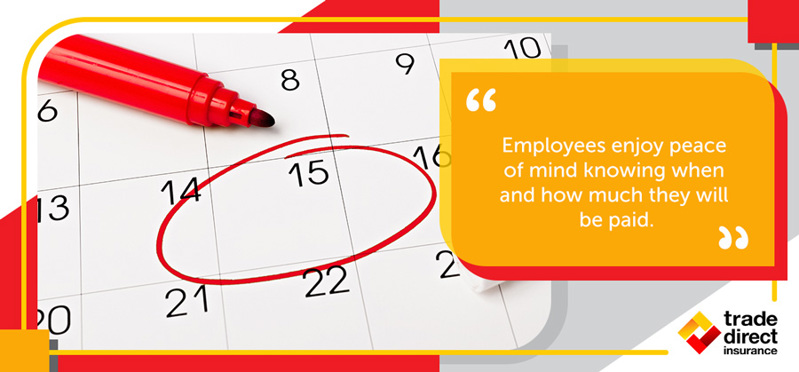
Working as a tradesman: self-employed vs employed
07 June 2024Are you a skilled labourer carving out your future in the construction industry? There's a significant decision ahead for anyone thinking about becoming their own boss in this sector: Are you better off employed by someone else or taking the self-employed route?
This guide takes a broad look at the pros and cons of both working structures. We'll also explain why certain kinds of business insurance form a critical part of this decision.
The case for employed work
Let's begin by assessing the benefits of traditional employment as a tradesperson in the UK construction industry:
Regular pay
As an employee, you'll benefit from a predictable fixed salary and the peace of mind knowing your basic income is stable each month. This makes budgeting far easier.
Reduced administrative burden
Your employer normally handles all business admin such as bookkeeping, taxes, and PAYE (Pay As You Earn) deductions. If you prefer to spend your free time away from paperwork, being employed makes sense.
Employee benefits
Some companies offer excellent incentives like company pensions, holiday/sick pay, and even professional development opportunities. Depending on the industry, there may also be union backing in the event of labour disputes.
Team dynamics and mentorship
Being part of a team can provide valuable learning opportunities and a sense of camaraderie often absent in self-employment.

The benefits of being a self-employed tradesperson
While the structure provided as an employee offers stability and certainty, becoming your own boss as a self-employed tradesperson opens up unique and potentially rewarding possibilities:
Unlimited earning potential
The harder and smarter you work as a self-employed independent contractor, the greater the potential for higher pay. You will be free to negotiate contracts with clients. You may also work longer hours at some points in the year, but that flexibility allows you to take charge of your income.
Independence
Choose the jobs you want, and set your own hours and rates. As a self-employed individual, you also choose which tools you bring to a project and even decide on your dress code. It's all about being free to manage your own work.
Building something that is your own
When you start as a self-employed tradesperson with aspirations, you're laying the foundation for a potentially scalable business. While growth carries added risks, you have the potential to hire a team and ultimately achieve far more financial stability with a successful enterprise of you own.
The limitations of regular employment
As an employee, your earning potential is capped by your agreed-upon salary and raises are subject to employer discretion.
You may also have less control over your schedule and work environment, be required to follow company policies and procedures, and your work may be directly supervised. You’ll also have limited influence over the types of projects you undertake.
The risks of self-employment
It's also vital to carefully consider the risks and obligations before making the leap to self-employment:
- Unpredictable income: Fluctuating workloads and seasonal factors can mean you sometimes end up with a tight bottom line while waiting for your next job or chasing payment from customers. Careful financial planning is key, as is marketing of your services.
- Administration: It's time-consuming and potentially confusing to juggle taxes, invoices, and the myriad of paperwork required of limited companies or sole traders. Many will seek out an accountant or financial advisor for assistance.
- No paid leave: Sick days and holidays come directly out of your own pocket as a self-employed person.
- Compliance and regulations: Staying up to date on industry regulations, health and safety requirements, and relevant licensing is crucial.
- Longer work hours: Building a successful business often requires long hours and dedication.
- Insurance obligations: As a self-employed worker, ensuring you have comprehensive and adequate business insurance cover is non-negotiable (see below).

Insurance essentials for self-employed tradesmen
Whether you work alone or as part of a small team, if you are self-employed the risks involved in construction mean insurance policies covering your liabilities are crucial, whereas your employer is likely to arrange business insurance if you are employed.
Self-employed tradesman insurance is going to be a vital part of setting up your business. Let's break down the essentials:
Public liability insurance
Public liability covers claims for compensation and damages if someone – a customer or member of the public – is injured or their property is damaged as a result of your work. A typical scenario would be the financial consequences of accidentally staining an expensive new carpet in a client's home.
Employers' liability insurance requirements
Employers’ liability insurance is legally required in the UK as soon as you hire even one employee, even if they are a part-timer or volunteer. It covers compensation claims in the event a staff member gets injured or falls ill from their work.
Professional indemnity for tradesmen
Professional indemnity insurance protects against claims related to negligent advice or errors in your work. For example, if you miscalculate measurements or wiring, leading to subsequent cost implications for the client, this insurance will cover the resultant costs if the client choses to sue you.
Other relevant forms of cover
It's sensible to also consider these valuable additions to your insurance coverage, as they tailor protection directly to the trades:
- Tools insurance: Covers expensive equipment against theft or accidental damage.
- Personal accident insurance: Protects your finances if you're unable to work after a serious injury or suffer ill health.
Construction industry employment options: making the right choice
Deciding between self-employment and employment ultimately depends on your individual priorities and circumstances. Consider the following factors:
- Risk tolerance: Are you comfortable navigating the uncertainties of finding consistent work and managing finances on your own?
- Financial goals: Do you prioritise a potentially higher income and the ability to scale your earnings, or are consistent income and financial security more important?
- Lifestyle preferences: Do you thrive on autonomy and flexibility, or do you prefer a structured work environment and defined responsibilities?
- Business acumen: Are you confident in your abilities to market yourself, manage finances, and navigate legal and administrative requirements?

Seeking professional guidance
The decision to become self-employed or remain employed is not one to be taken lightly. Consulting with a qualified accountant or business advisor can provide valuable insights into the financial implications of each path.
Additionally, exploring relevant business support resources provided by organisations like the Federation of Master Builders (FMB) can equip you with the knowledge and tools necessary to succeed in either scenario.
Remember, the journey doesn't end with your initial choice. You can always transition between self-employment and employment later in your career based on your evolving needs and circumstances. The key is to stay informed, adaptable, and proactive in managing your career trajectory.
Business insurance for tradespeople
Business insurance is an important consideration as a reputable self-employed tradesman or independent contractor. Your insurance cover acts as a safety net, mitigating financial risks and safeguarding your livelihood in the face of unforeseen circumstances.
You’ll want to make sure you’re paying a fair price and receiving good value for money. Fortunately, Trade Direct Insurance can help. With over 40 years of experience, we specialise in providing comprehensive business insurance solutions tailored to the specific needs of tradespeople in the UK.
Our insurance is available in customisable packages that cover essential business liabilities, provide protection against claims from employees, and offer other key forms of cover such as tools insurance.
For more information about our insurance for tradesmen, get in touch with Trade Direct Insurance today. Call us on 01483 521650, or email: enquiries@tradedirectinsurance.co.uk.
Trade Direct is authorised and regulated by the Financial Conduct Authority. The company is a leading UK independent broker providing a wide range of policies to tradesmen and construction workers.
This note is not intended to give legal or financial advice, and, accordingly, it should not be relied upon for such or regarded as a comprehensive statement of the law and/or market practice in this area. In preparing this note we have relied on information sourced from third parties and we make no claims as to the completeness or accuracy of the information contained herein. You should not act upon information in this bulletin nor determine not to act, without first seeking specific legal and/or specialist advice. We and our officers, employees or agents shall not be responsible for any loss whatsoever arising from the recipient’s reliance upon any information we provide herein and exclude liability for the content to fullest extent permitted by law.
